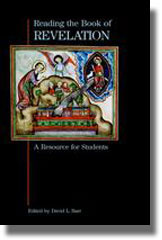
$22.00
The Apocalypse lends itself to multivalent readings, and this volume fills a gap for students and scholars by discussing how different methods apply to readings. Using historical, literary, and social analysis in combination with strategies such as social-conflict theory, philosophy, women’s studies, ethics, history of religions, postcolonial studies, and popular culture, the essays in this volume focus on specific texts and show not only how each helps interpret the text but also how diverse methods produce divergent readings of a text. Developed as a classroom resource for undergraduates, this work will also prove useful to graduate students, religious leaders, and others who wish to explore how methods shape our understandings of various texts, including Revelation.
David L. Barr is Professor of Religion at Wright State University in Dayton, Ohio. He is the author or editor of numerous books, includingIntroduction—Reading Revelation Today: Consensus and Innovations
—David L. Barr
1. The Story John Told: Reading Revelation for Its Plot
—David L. Barr
2. Ordinary Lives: John and His First Readers
—Leonard L. Thompson
3. The Beast from the Land: Revelation 13:11–18 and Social Setting
—Steven J. Friesen
4. Wolves in Sheep’s Clothing: Literary Opposition and Social Tension in the Revelation of John
—Paul B. Duff
5. A Tale of Two Cities and (At Least) Three Women: Transformation, Continuity, and Contrast in the Apocalypse
—Edith M. Humphrey
6. Doing Violence: Moral Issues in Reading John’s Apocalypse
—David L. Barr
7. Undercurrents and Paradoxes: The Apocalypse to John in Process Hermeneutic
—Ronald L. Farmer
8. Taking a Stand on the Sand of the Seashore: A Postcolonial Exploration of Revelation 13
—Jean-Pierre Ruiz
9. Spirit Possession: Revelation in Religious Studies
—Leonard L. Thompson
10. The Lion/Lamb King: Reading the Apocalypse from Popular Culture
—Jon Paulien
Conclusion—Choosing between Readings: Questions and Criteria
—David L. Barr
